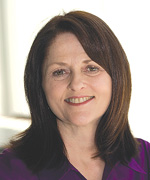Susan Lambert, Associate Professor in SSA
By William Harmsw-harms@uchicago.edu
News Office
 Susan Lambert |
|
The graduate students who come to the School of Social Service Administration to pursue a Ph.D. come from a wide variety of backgrounds—something Susan Lambert takes into account when she teaches the foundational course in research methods.
“Many of the students have come from other professional backgrounds and have decided they want to become researchers. Some are lawyers, some have master’s degrees in other disciplines, such as anthropology,” said Lambert, Associate Professor in SSA.
The topics that interest students coming to the Ph.D. track at SSA also vary greatly. Some students are interested in learning more about how direct intervention can benefit social work clients. Others are interested in more global, social problems, such as the lives of people in refugee camps.
Lambert teaches students how to structure a research project so that the work meets high standards that other scholars will respect.
“I teach them methods, ways to go about inquiry that are basic to any problem, no matter what they might be interested in. They need to learn how to establish validity in their results so that they, and others, will have confidence in their conclusions,” she said.
The students learn the principles of research design, empirical observation and theory to improve their research skills.
As Lambert works with students in the research methods classes and on individual projects as they advance through their program, she tries to help them “unpack the black box of developing knowledge,” she said.
“When students read a distinguished, published paper, they have a tendency to think that the piece began as it appears in its published form.” Helping students realize that articles often go through many drafts, and that scholars develop key insights during the writing process itself helps students realize that they too can transform their early work into polished publications, Lambert explained.
Learning how to conduct an effective study is one of the ways students learn to unpack that black box. They also must learn how to choose topics for their own work and for their dissertations, she said.
The topics they choose to pursue in graduate school are important because they are likely to define their careers as scholars.
“I advise them to choose an area of inquiry that will hold their interest for a long time,” she said. The topic needs to provide a platform for future work.
Along the way the going may get a little daunting, particularly for students who have families and work obligations that get in the way of finishing a Ph.D. In the process, students often become overwhelmed with the prospect of the work ahead of them.
“I check in with them and ask them where they are. There’s a difference between the process part of preparing a dissertation and the product stage,” she said.
“Students sometimes get discouraged because they don’t see the progress they’ve made in their research, and that’s because they haven’t started writing chapters yet,” she said. Lambert points out students’ progress, no matter what stage they have reached, including narrowing their focus or on framing their findings—progress that might not be immediately clear to them.
Seeing the finished project, as well as the work of her other students, including those in the master’s sequence is a great satisfaction for Lambert, who studies employment.
“Many of my students have gone on to work in nonprofits and other organizations in Chicago that deal with employment,” she said. “When I go to conferences and other events, they are there, and it’s exciting to see the contributions they are making.”
![[Chronicle]](/images/sidebar_header_oct06.gif)